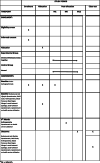Swāsthya, an integrated chronic condition management programme for families of patients with hypertension and diabetes mellitus: a study protocol for a randomised controlled trial
- PMID: 33422013
- PMCID: PMC7797137
- DOI: 10.1186/s12875-020-01357-w
Swāsthya, an integrated chronic condition management programme for families of patients with hypertension and diabetes mellitus: a study protocol for a randomised controlled trial
Abstract
Background: Kerala is known as the diabetes mellitus (DM) and hypertension (HTN) capital of the world, thus compelling health professionals to model strategies, addressing their social, behavioural, and cognitive risk factors and eliminating various barriers to management. This paper describes the protocol of our study that aims to examine the effectiveness and sustainability of an integrated care model for the management of chronic conditions and their risk factors through a family-based intervention. The proposed care model targets to modify systems and processes that predispose to chronic conditions by enhancing social cohesion and social networks, preventing lifestyle risks, developing iterative cognitive interventions, and engaging the family into customised treatment adherence strategies navigated by community health social workers (CHSWs).
Methods: A cluster randomised controlled trial (RCT) in selected participants will be conducted involving additional assessments prior to the baseline assessment. The assessment will identify and categorise patients into four risk groups, namely behavioural, social, cognitive, and multiple, based on dominant risks identified. Eligible participants will be randomly allocated (at a ratio of 1:1) into the intervention or control arm. The intervention arm will receive social, behavioural, and cognitive or multiple interventions corresponding to the identified risk groups, whereas the control arm will receive general intervention. Both the groups will be followed up at 6 months and 12 months post baseline to measure outcomes. The primary outcome will be the control of HTN and DM, and secondary outcomes include decreased depression and anxiety and improved functioning, social cohesion, and social network linkages. The sustainability and scalability of this intervention will be assessed through cost effectiveness, acceptability, and user friendliness of the integrated approach by performing a qualitative evaluation.
Discussion: This RCT will inform the potential paradigm shift from a medical model of chronic condition management to a multidimensional, multisystem, and multidisciplinary convergence model navigated by CHSWs. Such a model is not currently considered in the management of chronic conditions in Kerala.
Trial registration: Trial has been prospectively registered on Clinical Trial Registry of India- CTRI/2020/12/029474 on 1st December 2020.
Keywords: Diabetes mellitus; Hypertension; India; Integrated care model; Medical compliance; Study protocol.
Conflict of interest statement
The authors declare that they have no competing interests.
Figures
References
-
- WHO. Non communicable diseases. World Health Organization; 2018. Retrieved from https://www.who.int/news-room/fact-sheets/detail/noncommunicable-diseases.
Publication types
MeSH terms
Associated data
Grants and funding
LinkOut - more resources
Full Text Sources
Other Literature Sources
Medical


